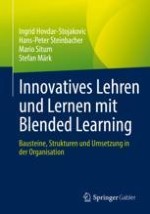2023 | OriginalPaper | Buchkapitel
4. Vom lernenden Individuum zur Lernenden Organisation
verfasst von : Ingrid Hovdar-Stojakovic, Hans-Peter Steinbacher, Mario Situm, Stefan Märk
Erschienen in: Innovatives Lehren und Lernen mit Blended Learning
Verlag: Springer Fachmedien Wiesbaden
Aktivieren Sie unsere intelligente Suche, um passende Fachinhalte oder Patente zu finden.
Wählen Sie Textabschnitte aus um mit Künstlicher Intelligenz passenden Patente zu finden. powered by
Markieren Sie Textabschnitte, um KI-gestützt weitere passende Inhalte zu finden. powered by
